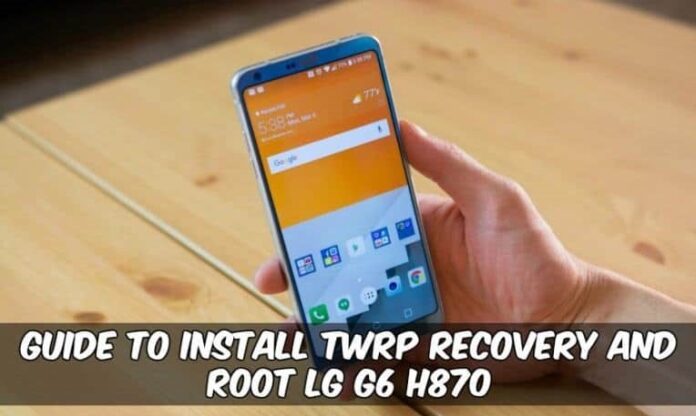This post will explain Root LG G6 Android 9. LG G6 (codename: h870/h872/us997) was basically launched in the year February 2017. The phone came out of the box along with Android 7.0 Nougat and later upgrade to Android 8.0 Oreo as well. Recently this device has also received the official TWRP recovery support too. So, on this page, we are going to guide you to install the TWRP Recovery on LG G6.
How to Root LG G6 and Install TWRP Recovery In 2024
In this article, you can know about Root LG G6 Android 9 here are the details below;
This guide basically contains both the written instruction and video tutorial in order to encourage you install it quickly. Make sure to download the files wanted and then also jump accurate into guidance on how to introduce TWRP Recovery and Root your LG G6. Just read this article to know all about How to Root LG G6 and Install TWRP Recovery. Let’s begin!
Also, keep in mind that before heading over to the process, you will have to unlock the device bootloader at first. As the smartphone OEMs give a locked bootloader to their devices because of some security companies. In plan to install any third-party data, you will have to unlock the bootloader. Then you will be competent to install TWRP System Recovery on your LG G6 device and also root as well. The TWRP Recovery can also take Nandroid substitutes, restore, wipe out system/data/cache, & much more. Also check USB data recovery software.
TWRP Recovery and its Advantages
Team Win Recovery Project is basically an open-source software custom recovery image for Android-based devices. It gives a touchscreen-enabled interface that allows users to install third-party firmware and back up the current system which is functions often unsupported via stock recovery images.
Benefits of TWRP Recovery:
- You guys can flash Custom ROM on LG G6 via TWRP
- You can also flash modding zip files in order to customize your phone
- Easy to flash and also use Xposed Modules using TWRP
- Easy to Root and Unroot through TWRP Recovery flashable zip SuperSU
- You guys can install Magisk on LG G6
- Easy to Create and Restore Nandroid Backup via TWRP Recovery.
- Really easy access to restore the Nandroid Backup.
- You can also flash the image file using TWRP Recovery on LG G6
- Easy to delete all bloatware using TWRP Recovery on LG G6.
- IN order to underclock and overclock.
- You can clean Wipe, Cache, and Data as well.
How to Root LG G6 and Install TWRP Recovery
Before going to the TWRP installation process, you have to make sure to follow all the pre-requirements mentioned below properly. Also check UltData for android data recovery.
Pre-Requirements:
- The file and also guide are supported for the LG G6 (All Variant) model only. Just don’t try it on other devices.
- LG G6 bootloader should also be unlocked.
- A PC or Laptop & a USB cable are required for this process.
- Also, create sure to get a Full Reserve of Device Data (No Root).
- Charge your device battery to full as well.
- You have to download All Required Files:
- No Verity opt Encrypt
- Download SuperSU Zip – For root thruogh SuperSU
- Download Magisk Zip – For root via Magisk
- USB Drivers: LG USB Drivers
- Download ADB and Fastboot and also install them on your PC
TWRP Recovery Details
- File Name TWRP Recovery
- Version V3.4.0 and Higher
- Support Official
- Developer TWRP Team
ADB and Fastboot Tool
After downloading all the required data, drivers, & tools, you have to follow the installation process.
- First of all, just turn on the Developer Options & USB Debugging form on your project.
- Head over to the project Settings > System > About Phone > then click on the Build Number seven times in order to enable Developer options mode.
- Now, head to the Developer options in the Settings menu and then turn on the toggle to turn on USB debugging.
- Next, you have to open the ADB & Fastboot folder on your computer. Then tap and hold the Shift key and right mouse tap in order to open the command window.
- Turn off your device > Press & hold the Volume Up + Power button together for a several seconds in order to enter into Fastboot mode.
- Now connect your project with the computer via a USB cable & then type the following code on the control windows and hit enter:
- adb reboot bootloader
Further
- Now, your project is connected happily as a fast boot device s well.
- You have to copy the next command & hit enter to check the fastboot device compared or not:
- fastboot tools
- Now, in line to install TWRP Recovery on your radiophone, then type the following command and press enter:
- fastboot flash recovery twrpname.img
- To just boot, you guys can use the command fastboot boot twrpname.img
- That’s just it. You’ve happily installed the TWRP Recovery on the LG G6 device actually. Now, you have to flash the Root as well.
What is Root?
Smartphone Rooting is basically the unofficial way to enable an administrator or superuser access to your device system and subsystem as well. Hence, the user can easily tweak, change, edit, or also delete system files and apps easily.
Along with the help of rooting, you can uninstall bloatware, increase device performance, decrease battery draining, install Xposed modules, and much more. But, smartphone rooting will void the device warranty and you may not get software OTA updates anymore as well. Incorrect form of rooting can including brick your device easily actually. Thus, make sure to follow the model accurately. Also check data recovery software.
The benefit of Rooting:
- You guys can get access to all files on your LG G6, also even the data which perform in the root directory of your phone.
- You can also increase the performance of your LG G6 through overclocking.
- With rooting you can increase battery life via underclocking LG G6.
- Now uninstall Bloatware on LG G6.
- You guys can block Ads on any Android applications such as Youtube and other game-related applications as well.
- With Rooting LG G6, you can View, Edit, or also Delete any system file inside the root directory.
- You guys can install the Xposed Framework and a lot of Xposed module support.
Conclusion
Alright, That was all States! I hope you guys like this article & also find it helpful to you. Give us your feedback on it. Also if you fellows have additional queries & issues connected to this article. Then let us understand in the remarks segment below. We will get back to you soon.



